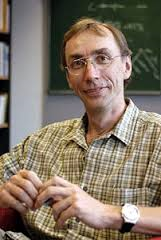Difference between revisions of "Svante Paabo"
From QueerBio.com
| (One intermediate revision by the same user not shown) | |||
| Line 12: | Line 12: | ||
Scientist | Scientist | ||
| + | |||
| + | ==Notable Achievements== | ||
| + | |||
| + | Nobel Prize | ||
==Description== | ==Description== | ||
| − | Biologist and Director of the Department of Genetics at the Max Planck Institute for Evolutionary Anthropology since 1997. One of the founders of paleogenetics, a discipline that uses the methods of genetics to study early humans and other ancient populations. Author of the book ' Neanderthal Man: In Search of Lost Genomes' (2014). Recipient of many awards and prizes, including the Kistler Prize (2009). Member of the Royal Swedish Academy. Bisexual. | + | Biologist and Director of the Department of Genetics at the Max Planck Institute for Evolutionary Anthropology since 1997. One of the founders of paleogenetics, a discipline that uses the methods of genetics to study early humans and other ancient populations. Author of the book ' Neanderthal Man: In Search of Lost Genomes' (2014). Recipient of many awards and prizes, including the Kistler Prize (2009) and the Nobel Prize in Physiology and Medicine (2022). Member of the Royal Swedish Academy. Bisexual. |
==See Also== | ==See Also== | ||
* [[LGBTQ Biologists and Chemists]] | * [[LGBTQ Biologists and Chemists]] | ||
| + | * [[LGBTQ Individuals in the Fields of Sociology and Anthropology]] | ||
==Further Reading/Research== | ==Further Reading/Research== | ||
Latest revision as of 00:56, 1 September 2024
Contents
Country
Sweden
Birth - Death
1955 -
Occupation
Scientist
Notable Achievements
Nobel Prize
Description
Biologist and Director of the Department of Genetics at the Max Planck Institute for Evolutionary Anthropology since 1997. One of the founders of paleogenetics, a discipline that uses the methods of genetics to study early humans and other ancient populations. Author of the book ' Neanderthal Man: In Search of Lost Genomes' (2014). Recipient of many awards and prizes, including the Kistler Prize (2009) and the Nobel Prize in Physiology and Medicine (2022). Member of the Royal Swedish Academy. Bisexual.
See Also
Further Reading/Research
- http://www.theguardian.com/science/2014/feb/15/svante-paabo-dna-neanderthal-genetics
- http://arthurreber.com/home/a-note-of-admiration-for-svante-paabo.html
- http://www.nytimes.com/2014/04/20/books/review/neanderthal-man-by-svante-paabo.html?_r=0
- https://www.ted.com/talks/svante_paeaebo_dna_clues_to_our_inner_neanderthal

